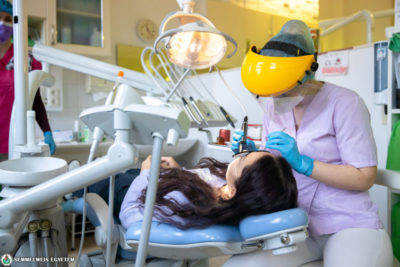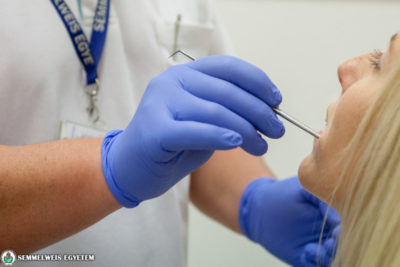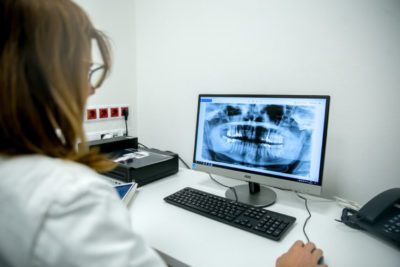More than 2,000 people have registered for the online presentations of the 12th Semmelweis Health Days program series, organized on 25 March entitled “Children in the Family: From Birth to Adulthood” at Semmelweis University’s 1st and 2nd Department of Pediatrics. Those interested had the opportunity to participate in twenty interactive presentations, personalized counseling, consultation opportunities, a resuscitation demonstration and a special gymnastics demonstration.
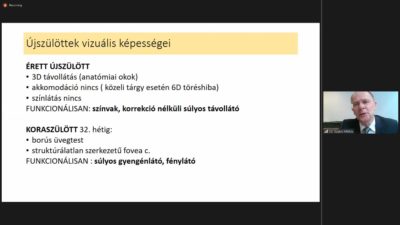 Why is the baby crying? What does baby crying warn of? What do newborns see, hear, and feel in the first hours of their life? What does abdominal pain warn you about? Infant movement development for babies of 0-6 months’ age led by physiotherapists. Infant and Child Basic Resuscitation Demonstration – these were the most popular presentations of Semmelweis Health Days held on 25 March. The presentations of the residential and public health program series of Semmelweis University celebrating its 250th anniversary were available to view and listen to online, via Zoom.
Why is the baby crying? What does baby crying warn of? What do newborns see, hear, and feel in the first hours of their life? What does abdominal pain warn you about? Infant movement development for babies of 0-6 months’ age led by physiotherapists. Infant and Child Basic Resuscitation Demonstration – these were the most popular presentations of Semmelweis Health Days held on 25 March. The presentations of the residential and public health program series of Semmelweis University celebrating its 250th anniversary were available to view and listen to online, via Zoom.
Particular attention was paid to presentations about children’s nutrition. Dr. Zsófia Gács, teaching assistant at the 2nd Department of Pediatrics showed how to avoid the development of childhood obesity. Krisztina Czuppon, dietitian at the 2nd Department of Pediatrics talked about proper dieting and a new Hungarian nutritional recommendation, “Clever plate”. This makes it easy to determine how much of different types of food will get on our plate.
Important presentations have been provided on how children may become diabetic, whether it can be cured, and how to treat this disease. Dr. Péter Tóth-Heyn, deputy director and associate professor of the 1st Department of Pediatrics answered these questions and also talked about the warning signs. Dr. Andrea Luczay, endocrinologist and associate professor at the 1st Department of Pediatrics talked about how appropriate and complex treatment begins after the diagnosis, as diabetes can be well maintained with due care.
Many people were interested in how to recognize early tumors: about this, Dr. Mónika Csóka, oncologist, associate professor and deputy director of the 2nd Department of Pediatrics informed the participants, who, in addition to the importance of screening tests, also drew the attention of the participants to the importance of paying attention to body signs, sudden weight loss, fever, fatigue and unusual pain. If anyone experiences this in the case of their child, they should consult a pediatrician immediately.
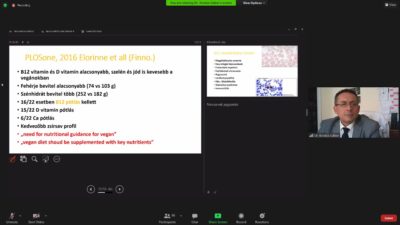 Dr. Ágnes Németh, chief physician of the 2nd Department of Pediatrics held a presentation entitled “What is calcium not good for?”, who also talked about the most serious form of allergy, anaphylaxis, and the most important things to do in such a case. Dr. Gábor Kovács, director at the 2nd Department of Pediatrics discussed the relationship between children’s healthy development and meat consumption in his presentation.
Dr. Ágnes Németh, chief physician of the 2nd Department of Pediatrics held a presentation entitled “What is calcium not good for?”, who also talked about the most serious form of allergy, anaphylaxis, and the most important things to do in such a case. Dr. Gábor Kovács, director at the 2nd Department of Pediatrics discussed the relationship between children’s healthy development and meat consumption in his presentation.
As Dr. Dániel Erdélyi, associate professor at the 2nd Department of Pediatrics pointed out in his presentation on enlarged lymph nodes and the importance of early tumor detection, the hundreds of lymph nodes in our body play a very important role in the functioning of the immune system. Dr. Tamás Constantin, associate professor at the 2nd Department of Pediatrics spoke about the great responsibility of parents for childhood musculoskeletal disorders, as it is crucial for prevention and effective treatment that early signs are detected in time and that a specialist is consulted.
“Hepatic disorders in infancy and childhood belong to the category of rare diseases, but nowadays liver transplantation for acute liver failure or end-stage liver disease has become available at this age as well”, highlighted Dr. Antal Dezsőfi-Gottl, deputy director of the 1st Department of Pediatrics.
The presentation also revealed the extent to which family life changes after performing a life-saving surgery.
Encouraged by last year’s success, the physiotherapists of Semmelweis University’s 2nd Department of Pediatrics have again offered a special program for parents and their babies sitting in front of the screens. Again, the maximum number of participants registered this time as well for the interactive movement development entitled “Skillful Babies, Smart Kids”. The online gymnastics entitled “Let’s do exercises together – childhood movement development demonstration with special gymnastic exercises from the age of 6” provided training for young children.
The importance of vitamins is always a current issue for the defense of our body to prevent certain diseases and to prevent the development of vitamin deficiency. Dr. András Szabó, professor of the 2nd Department of Pediatrics held a presentation about the causes and consequences of vitamin D deficiency. In another presentation, Dr. András Szabó spoke about the fact that the prevention of adult obesity should start in childhood. Dr. Péter Krivácsy, chief physician of the 1st Department of Pediatrics, presented what we can learn from a drop of blood in the pediatric emergency departments.
Dr. Dorottya Czövek, resident of the 1st Department of Pediatrics, described the Home Breathing Support Program, which helps children who have problems with breathing and sleep at night as well as need breathing support during their sleep to be stronger and healthier.
At the end of the program, Dr. Gábor Kovács, director of the 2nd Department of Pediatrics said that he considered the event extremely successful, thanks to thorough preparations and the excellently structured presentations.
“The presentations also provided useful information for the lay participants, which was the reason for the fact that more than 2,000 people joined the program online”, he emphasized.
Eszter Csatári-Földváry
Cover photo (illustration): Pixabay
Photo: Semmelweis University– Attila Kovács
Translation: Katalin Illés-Romhányi
